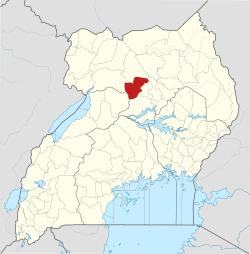Victoria Nyanjura
Victoria Nyanjura (born circa 1982) is a Ugandan community activist, who is the founder of Women in Action for Women (WAW), a Ugandan-based non-governmental organization, that attempts to improve the lives of young people and women through vocational training, business education and guidance in accessing community and government services.[1]
Victoria Nyanjura | |
|---|---|
| Born | circa 1982 (age 37–38) |
| Nationality | Ugandan |
| Citizenship | Uganda |
| Education | St. Mary's College Aboke (High School Diploma) Kyambogo University (Bachelor of Development Studies) Uganda Management Institute (Postgraduate Diploma in Monitoring and Evaluation) University of Notre Dame (Master of Global Affairs) |
| Years active | 2004–present |
| Known for | Gender activism |
| Title | Founder of Women in Action for Women (WAW), an NGO |
Background and education
Nyanjura was born in Oyam District, in the Lango sub-region, in the Northern Region of Uganda. She attended primary school locally. She obtained her High School Diploma from St. Mary's College Aboke, in Kole District.[1][2]
Her first degree, a Bachelor of Development Studies, was obtained from Kyambogo University, in Kampala, Uganda's capital city. As of February 2020, she is pursuing a Master of Global Affairs, specializing in International Peace Studies at the University of Notre Dame. She also holds a Postgraduate Diploma in Monitoring and Evaluation, awarded by Uganda Management Institute, also in Kampala.[1][2]
Career
Victoria worked as a volunteer at the Justice & Reconciliation Project, a non-governmental organization that aims at rehabilitation war-ravaged communities in Northern Uganda, based in the city of Gulu. She later became an employee at the NGO, in its Gender Justice department.[3] She has also worked at International Justice Mission, another NGO, focused on protecting Ugandan widows on property ownership.[1]
Other considerations
In 1996, at the age of 14 years, Victoria Nyanjura was one of the 139 girls abducted from St. Mary's College Aboke on 10 October 1996, by rebels of the Lord's Resistance Army. The deputy headmistress of the college, Sister Rachele Fassera of Italy, pursued the rebels and successfully negotiated the release of 109 of the girls. 30 of the girls were retained by the rebels. Victoria was one of the 30. After eight years in captivity, characterised by torture and sexual abuse, she was able to escape and regain her freedom n 2004.[1][2]
Recognition and awards
In 2018, Victoria Nyanjura was the recipient of the Navarra International Solidarity Award, organized by the Government of Navarre, Spain, and Laboral Kutxa, a Spanish credit union. The award recognizes individuals, NGOs, and institutions whose work advances the United Nations Sustainable Development Goals. She shared the award, and a €25,000 prize with three other African women, Hulo Guillabert, Theresa Kachindamoto and Oumou Sall-Seck. The group was nominated by the Spanish diplomatic organization Casa África.[4]
See also
References
- Hudson Apunyo (16 February 2020). "Former LRA captive wins International award". New Vision. Kampala. Retrieved 23 February 2020.
- Skoll Organization (2020). "Victoria Nyanjura: Biography". Skoll Organization. Retrieved 23 February 2020.
- Oryem Nyeko (22 May 2015). "Victoria Nyanjura, A Powerful Woman". Gulu, Uganda: Justice & Reconciliation Project. Retrieved 23 February 2020.
- Kroc Institute for International Peace Studies (10 October 2018). "Master's Student Awarded for Human Rights Work in Uganda". Notre Dame, Indiana, United States: Joan B. Kroc Institute for International Peace Studies. Retrieved 23 February 2020.
